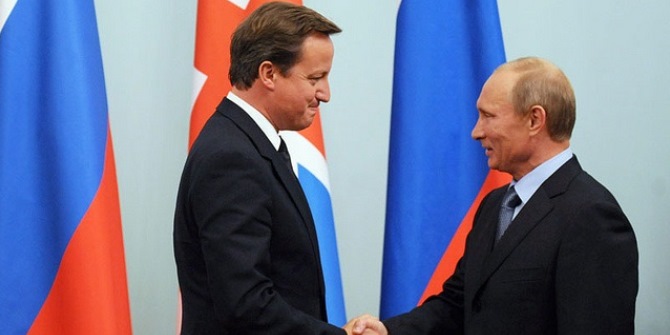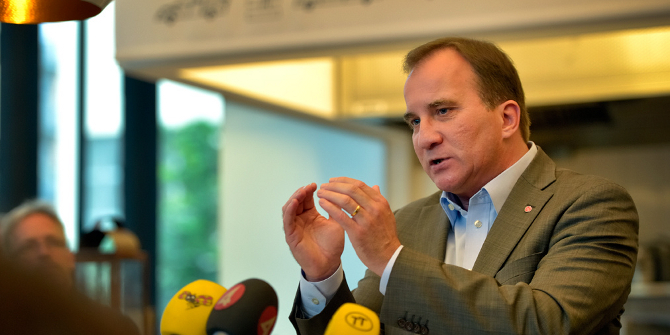 The siege of Homs continues and Syrian opposition groups are claiming that acts of genocide are being carried out by the Assad regime. Chris Brown notes that while the UK can no longer play a key military role, the responsibility to protect civilians could lead to encouraging and supporting a Turkish-led operation.
The siege of Homs continues and Syrian opposition groups are claiming that acts of genocide are being carried out by the Assad regime. Chris Brown notes that while the UK can no longer play a key military role, the responsibility to protect civilians could lead to encouraging and supporting a Turkish-led operation.
The situation in Syria is deteriorating day by day, but last Saturday’s vote in the UN Security Council demonstrates that no resolution to the ongoing crisis is likely to come from that quarter; what, then, is the next step? Influential voices are raised in favour of Western intervention to establish a ‘safe area’ in Syria and to impose a ‘no-fly’ zone to encourage defections from the Syrian army which at the moment may be deterred by potential retaliation from the loyal Syrian Air Force. Would such an intervention be sensible? Is there much that could be done in this situation?
First, a few comments on the Security Council vote; the draft resolution attracted 13 positive votes, but was vetoed by both Russia and China – the Russian vote was crucial since the Chinese seem to have voted the way they did rather than cast their usual abstention because they did not want to isolate their ally. Why did Russia use its veto? The influential realist Stephen Walt, writing in his Foreign Policy blog, suggests the veto was blowback from the NATO-led Coalition’s decision to interpret its mandate in Libya last year to encompass regime change, a decision Russia strongly opposed at the time.
This seems over-complicated; South Africa and India certainly shared Russia’s disapproval of the Libyan campaign, and yet, perhaps surprisingly, they voted for the draft resolution. Russia’s decision is actually easy to explain as a combination of general principle, i.e. a long standing hostility to external interference in the internal affairs of sovereign countries, and very specific national interests – the Assad regime is an ally, Russia’s last in the Mediterranean, and any plausible successor regime is unlikely to continue in this role. Walt is, one suspects, ignoring the obvious explanation for Russia’s action in order to give additional credibility to his own oppositional stance over Libya.
To my mind the big surprise was not that Russia vetoed the draft, but that all the non-permanent members, including India, Pakistan and South Africa voted in favour. I argued that the BRIC abstentions on the Libyan Resolution (UNSCR1973) did not bode well for the future of such interventions – well, this time two of the BRICs voted positively, which is significant; even though the draft resolution did not authorise the use of force it did, effectively, propose regime change and the willingness of India to go along with this is very interesting.
To return to the key question, where do we go from here? When the International Commission on Intervention and State Sovereignty brought out their report on the Responsibility to Protect they anticipated the possibility of a Security Council veto in circumstances where there was a ‘conscious-shocking situation crying out for action’ arguing that although action bypassing the Security Council would be fraught with difficulty it might still be the least-worst option. Is such action justified in this case?
Two considerations ought to be paramount in answering this question.
First, it must be absolutely clear that the ownership of actions such as establishing safe areas or no fly zones must lie with the Arab League and with Turkey. The Arab League is central because action without UN authorisation needs the support of the relevant regional organisation if it is to have any chance of being considered legitimate; Turkey is central because of its military strength and geographical position; any ‘safe area’ would actually be safe only if guaranteed by Turkey and Turkish aircraft would have to take the lead in enforcing a no-fly zone.
I suggest that what the major Western members of NATO should be doing is making it clear to Turkey’s Prime Minister Erdogan that they consider his country to be the leader in this matter and thus that it is his decision, along with the Arab League, on whether to move to direct action – but that if he takes that decision they would support him with aircraft, munitions, and in the case of the UK and the US an initial cruise missile attack on Syria’s air defences. The basic point is that we should not try to call the shots – Turkey would bear the brunt of any action and is entitled therefore to decide what needs to be done.
Second, we should be clear that, as the Libyan experience demonstrated very clearly, there are no half-way houses in matters of this kind. If we support the opposition then we have to make sure they win. Just as Gaddafi could not be left in power once the NATO-led coalition acted last year, so Assad would have to go if similar actions were to be undertaken in Syria. Documents such as the Responsibility to Protect report give the impression that ‘protection’ is something that can be carried out a-politically without taking sides. This is clearly wrong and in this respect at least Rifkin and Joshi get it right – we would have to ‘support’ the Syrian opposition, not just protect them. The obvious problem is that this opposition is clearly very divided and so far has resisted attempts by the Arab League and Turkey to unite them.
Moreover, whereas Gaddafi’s support was restricted to those who benefitted directly from his rule, such as regime officials and the inhabitants of his home town, Assad’s regime appears to have more solid roots in Syrian society, in particular drawing support from minority groups frightened by the implications of victory for what looks like an opposition drawn from the majority Sunni religious grouping. In other words, interveners will have to ensure that the opposition will win, but this, although achievable, is not going to be even as easy as it was in Libya, where the regime held out for much longer than most anticipated.
So, difficult decision lie ahead – though I argue these decisions are mainly for the Turkish leadership rather than the British Cabinet. If action is decided upon, what would be Britain’s role? Largely symbolic I suggest; the RAF is still re-stocking after the Libyan campaign and committed in Afghanistan, and the Navy is overstretched by its obligation in the anti-piracy campaign in the Indian ocean.
With no functioning aircraft carrier, operations in the Mediterranean would depend on others for air cover; the best the UK could do would be to send a nominal contribution to support the Turkish air force, the third largest in NATO with a large 250+ fleet of excellent F-16 aircraft and no other compelling commitments. For better or worse, the days when the UK could be a key partner in operations of this kind are long gone.
Please read our comments policy before posting.






